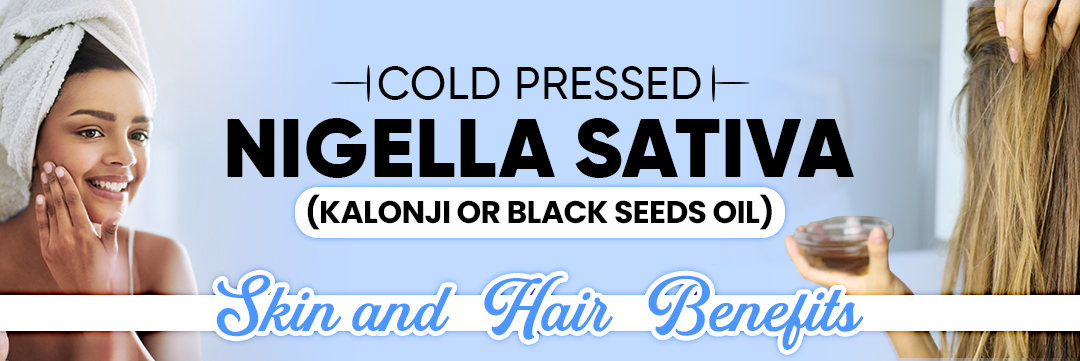Nigella sativa also known as kalonji or black seeds, is a flowering plant that has been used in traditional medicine for its health properties for centuries. It contains a variety of beneficial compounds, such as thymoquinone, antioxidants, vitamins, and essential fatty acids, which offer potential benefits for both hair and skin health.

BENEFITS FOR SKIN
Nigella sativa (Kalonji or black seeds) oil has been used for centuries for the treatment of many skin conditions, for dermatological disorders, and in cosmeceutical formulations. For example, it is used for acne vulgaris, burn, wounds, and injury treatment, as an anti-inflammatory for different kinds of skin inflammations, and skin pigmentation effects.
Antifungal: Nigella sativa(Kalonji or black seeds) oil showed antifungal activity against most pathogenic fungi. Candida tropicalis, Aspergillus flavus, and thymoquinone, which is the main composition of the oil, showed antifungal activity against most fungal strains.
Wound healing: Nigella sativa(Kalonji or black seeds) oil has good activity on increasing collagen formation and increasing rate of epithelialization. Therefore, it has an excellent effect as wound healing and moisturizing agent. These effects suggest topical use of kalonji oil to accelerate wound healing. In one study, it was seen that kalonji oil when applied to skin reduces tissue damage and decreases bacterial growth.
Psoriasis: It is one of the common skin conditions, which is an autoimmune skin disorder and can be itchy and painful. In an experimental study, it was found that Nigella sativa(Kalonji or black seeds) oil had a better effect as an antipsoriatic. However, the best results were seen with a combination of local application and oral dosage.
Acne vulgaris and pimple treatment: Nigella sativa(Kalonji or black seeds) oil's anti-inflammatory and antibacterial properties can be beneficial in treating acne and pimples by reducing inflammation and fighting off acne-causing bacteria. In a recent study, a gel formulation made from kalonji oil was used for the treatment of acne vulgaris as compared to the traditional therapy. Good results were obtained with the use of kalonji oil gel.
Therefore, it is safe to say that Nigella sativa(Kalonji or black seeds) oil is a good candidate in the treatment of inflamed skin which can be caused by infection, irritation, rashes, dermatitis, acne, and psoriasis.
Anti-aging effects: The antioxidants in Nigella sativa can help combat free radicals, which contribute to skin aging. Regular application of Nigella sativa(Kalonji or black seeds) oil may help reduce the appearance of fine lines, wrinkles, and other signs of premature aging.
Vitiligo: Vitiligo, is a hypopigmentation disorder which causes considerable psychological damage in a large proportion of its sufferers. Research was made on patients suffering from vitiligo lesions. Good results were obtained in decrease in the lesions size. It was then decided to include Nigella sativa(Kalonji or black seeds) oil in the basic treatments. Nigella sativa(Kalonji or black seeds) oil has an ability to spread melanin (skin pigment) within the skin.
Cosmeceutical Application: Nigella sativa(Kalonji) seeds and oil is used in cosmetics for its aroma component. When applied topically, Nigella sativa(Kalonji or black seeds) oil can act as a natural moisturizer for the skin, helping to lock in moisture and prevent dryness.
SPF Properties: Nigella sativa(Kalonji or black seeds) oil has an SPF (sun protective factor) value of more than 2, so it has protective properties against the UV rays of sun.
Many commercial cosmetics products contain Nigella sativa(Kalonji or black seeds) extract or Kalonji oil as their ingredient to enhance their cosmeceutical properties.

BENEFITS FOR HAIR
In Western Asia, Northern Africa, and parts of Europe where Nigella sativa(Kalonji or black seeds) is a native plant—NS has long been thought to help with hair growth, giving limp or thinning locks a boost and soothing scalp conditions. Nigella sativa(Kalonji or black seeds) oil’s crown boosting powers can be attributed to thymoquinone, a component of the Nigella sativa(Kalonji or black seeds) oil that has antioxidant and anti-inflammatory properties. It helps to create a supportive scalp environment for healthy hair growth, as healthy hair cannot grow on an inflamed scalp.
Promotes Hair Growth: Some studies suggest that Nigella sativa may help stimulate hair follicles and promote hair growth, making it potentially beneficial for those experiencing hair thinning or hair loss.
Telogen effluvium: It is a condition that is characterized by sudden thinning of hair. In a study the participants suffering from telogen effluvium showed significant improvement when treated with Kalonji oil.
Strengthens Hair: The presence of essential fatty acids and amino acids in Nigella sativa(Kalonji or black seeds) oil can help strengthen the hair shaft, reducing breakage and split ends.
Addresses Scalp Issues: Nigella sativa's anti-inflammatory and antimicrobial properties may help soothe scalp conditions like dandruff and scalp irritation.
Hair texture and appearance: The essential fatty acids found in Nigella sativa(Kalonji or black seeds) can help nourish the hair and improve its overall texture and appearance, making it look healthier and shinier.
How to Use Nigella sativa(Kalonji or black seeds) Oil for Skin and Hair?:
Topical application: You can apply Nigella sativa(Kalonji or black seeds) oil directly to your scalp to promote hair growth and reduce scalp inflammation. For the skin, apply the oil as a moisturizer or mix it with your favorite carrier oil (e.g., coconut oil, almond oil) for a nourishing and rejuvenating skin treatment.
Consumption: Consuming Nigella sativa seeds or oil orally may also provide some benefits for hair and skin health. However, it's essential to consult with a healthcare professional before adding any supplements to your diet, especially if you have existing medical conditions or are taking medications.
Word of Caution: Individual responses to natural ingredients may vary, therefore, it is a good idea to perform a patch test before applying any new product to a larger area of your skin to check for allergic reactions. If you experience any adverse reactions, discontinue use and consult a healthcare professional.
Ms Sunita Roy Chowdhury, Senior Nutritionist, Dietician and Nutrition Educator
Healthynudgez and Guiding Stars Open Learning Academy,
Under the banner of SS Guiding Stars Pvt. Ltd.
Disclaimer
At Multano we are passionate about helping people make their lives healthier and happier. All information provided in this article is researched and authenticated by qualified experts. We are dedicated to providing reliable and accurate information to our readers. However, please use the information provided here with discretion. Any changes in medication/diet must be done with the approval of your treating medical practitioner/Dietician only.


